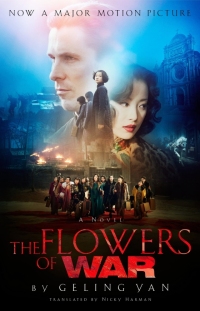
First published in 2006; published in trnaslation by Other Press on January 31, 2012
The Flowers of War takes place during the 1937 Nanking Massacre. Fleeing the fighting that accompanies the Japanese occupation of Nanking, women from a brothel climb the walls surrounding the church compound maintained by Father Engelmann. With hungry schoolgirls in the attic and sassy prostitutes in the cellar, the missionaries become desperately short of food, water, and patience. Hiding in the compound’s graveyard is Major Dai, wounded after a skirmish with Japanese soldiers. When two more wounded Chinese soldiers arrive at the gate, Dai emerges and demands that they be sheltered. Father Engelmann faces a dilemma: if he turns them away, they will be captured and killed by the Japanese; if he gives them refuge, he will be compromising the neutrality of the church and placing the schoolgirls at risk. The story that follows touches upon the lives of those within the compound’s walls as they try to avoid being victims of the war crimes committed by the Japanese Army.
Given the dramatic setting, much of the novel is surprisingly weak. The characters are well constructed but familiar; the prostitutes are similar to the other prostitutes who make regular appearances in Asian novels (including Geling Yan's infinitely superior The Lost Daughter of Happiness), while Father Engelmann channels the standard American priest serving in a distant land. We learn bits and pieces about the lives of various members of the ensemble cast, prostitutes and soldiers and students and missionaries, but not enough to appreciate any character completely. A schoolgirl named Shujuan is often spotlighted but we know little about her beyond her petty jealousies in matters of friendship. A prostitute named Yumo gets more attention than the rest but she’s an empty outline of a character.
The Flowers of War has substantial merit despite its relatively undistinguished cast of characters. As is generally true in a novel that describes the atrocities of war, it would be difficult to remain untouched by the narrative. The story produces some tender moments as groups of clashing characters -- very different in their upbringings and attitudes -- are forced to interact with each other. Geling Yan creates palpable tension whenever Japanese soldiers make an appearance. The ending and its karmic message is sensational; it is nearly enough to redeem the novel as a whole.
Yan writes (or is translated) in an undistinguished style, notable only for its plainness. That doesn’t mean the writing is bad or unpolished; the prose is bland but serviceable and the story is easy to read. It’s a shame, however, that such a powerful story was not told in more powerful language. Ultimately, I recommend the novel for the story it tells rather than the way it is told.
RECOMMENDED